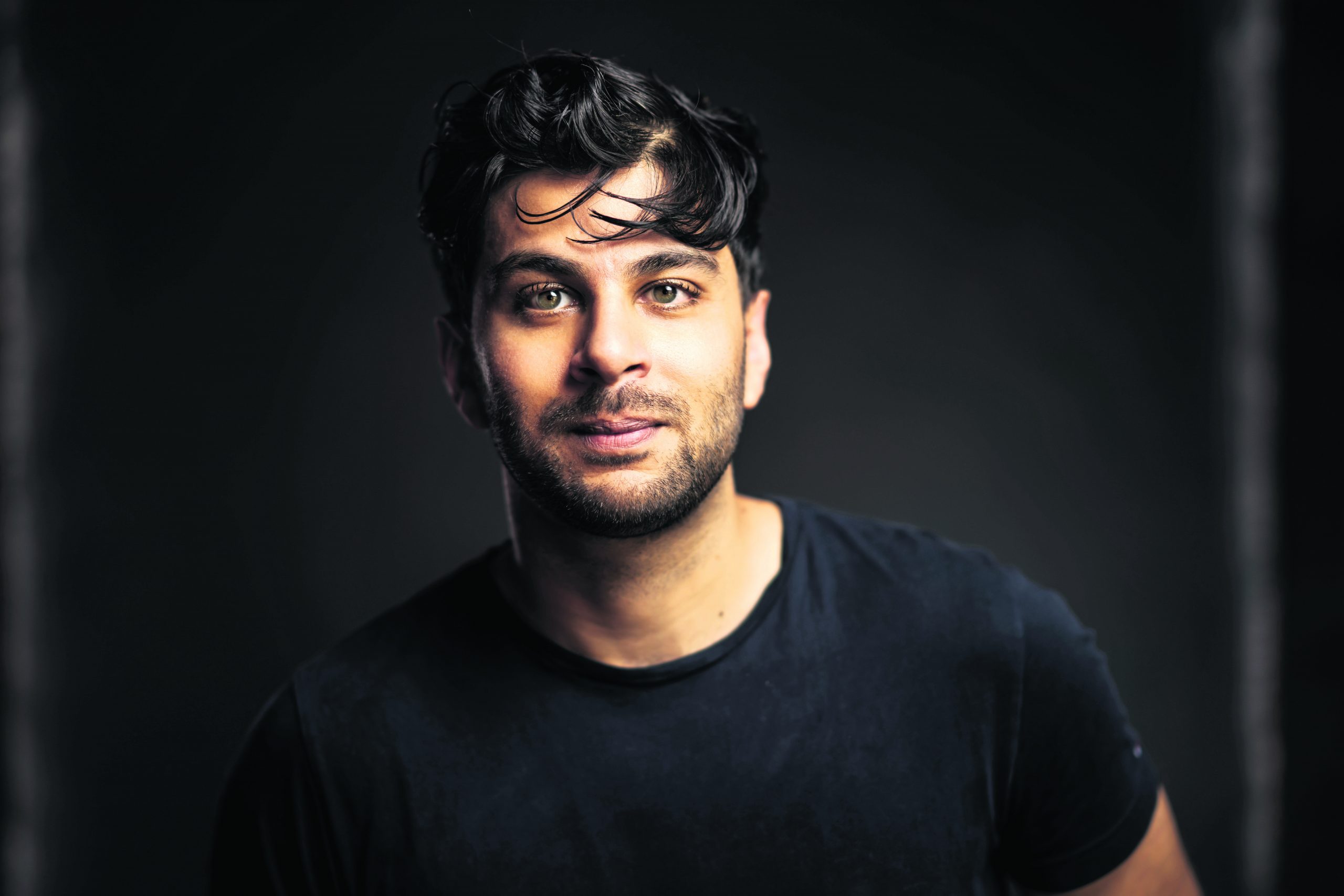Posted: 02 April 2024
Artist Spotlight: Playwright, Screenwriter and Cultural Producer, MOHAMED-ZAIN DADA

Mohamed-Zain Dada, goes by the name Zain, is a playwright and cultural producer. His first writing credit, Emily (Glitched) In Paris was for the Royal Court Theatre’s Living Newspaper series in March 2021.
He is also an alumnus of BBC Drama Room’s 2022-23 cohort. Zain’s debut play, Blue Mist premiered at the Jerwood Theatre Upstairs at the Royal Court Theatre in October 2023 to four and five star reviews and was nominated for an Olivier Award. His newest play, Dizzy will premiere at the Sheffield Playhouse in September 2024.
Your debut play, Blue Mist, opened to rave reviews at the Royal Court last year. Congratulations. For those who sadly weren’t able to catch it, tell us what it was about and why you wanted to write it.
Blue Mist follows Jihad, an aspiring journalist who reconnects with his two childhood friends, Rashid and Asif. At Chunkyz shisha lounge, jokes flow, laughter follows and ideas are born. It’s a home away from home for them. When Jihad’s idea for a documentary about Chunkyz and shisha lounges across the country wins a competition with a big production company, his boys are overjoyed. It could be his big break.
But when the production company, Ajami Media starts making demands on the narrative of the proposed documentary, Jihad has to make painstaking choices about the kind of journalist he wants to be. The decisions he makes threatens to split his beliefs in two.
I wrote Blue Mist to explore the joy and fun of spaces like Chunkyz Shisha Lounge where you can be the fullest version of yourself. I was also deeply inspired by the play Made in England by Parv Bancil which explored the idea of ‘selling out’ and my play really developed from there.
What is the most challenging thing about being a creative freelancer and do you have any top-tips on how you deal with this?
We’re living in a moment of extreme precarity with unaffordable rents, stagnant wages, the defunding of the creative sector and that doesn’t even include the challenges that the theatre industry and new writing venues are facing. In and amongst all those things, it’s important to acknowledge that a lot of these things are not in your control and rejection isn’t a reflection of your talent and creativity.
I still work part-time in the Mayor of London’s Culture and Community Spaces at Risk team so if I’m not writing, I’m supporting spaces that are threatened with closure across the city. I’m often exposed to how difficult it is for creative venues to survive in a city like London where high land values, high rents and the threat of redevelopment looms large.
My advice in terms of freelancing would really to find the set-up that works for you. I don’t believe there is a one-size-fits-all approach to freelancing. Some people balance writing with facilitation work and others have part-time or full-time day-jobs that are completely unrelated to their craft.
Who were your creative inspirations growing up?
I remember being completely captivated by Benjamin Zephaniah when I first read his anthology Too Black, Too Strong at my local library. I used to be part of a youth poetry collective in my teens called Words Apart and the lead youth worker, Arjunan Manuelpillai (also a brilliant poet) introduced me to the likes of Linton Kwesi Johnson and Malika Booker. We would often perform as a group at local community spaces but also at the Southbank Centre and it’s where I met Palestinian poets like Remi Kanazi and Suheir Hammad. Some of my all-time favourite poetry anthologies are The Rebel Silhouette by Faiz Ahmed Faiz and The Country without a Post Office by Agha Shahid Ali.
What was the last play you saw?
I’ve just seen Shifters by my friend, Benedict Lombe. It’s an incredibly moving play that explored the realities that can make romantic love difficult in 2024. I’ve also really enjoyed seeing The Iron Claw and All of Us Strangers in the cinema.
What advice would you give to someone wanting to become a playwright?
As I’ve said before, it’s not an easy environment for aspiring playwrights right now with the defunding of new writing venues and theatres becoming more risk adverse post-COVID. However, one thing I would say is to find ways to connect with your peers.
There are also still brilliant schemes out there like Soho Theatre Writer’s Lab and the Introduction to Playwriting group at the Royal Court. I wrote Blue Mist on these programmes and at the Royal Court, it’s where I developed a working relationship with the brilliant director of this play, Milli Bhatia who really encouraged me to lean into the abstract and whose overall sense of purpose and drive in theatre has been massively inspiring for me. In a similar way, the former literary team at the Royal Court (Jane Fallowfield, Gurnesha Bola and Ellie Fulcher) have informed so many iterations of Blue Mist with brilliant notes. It would not have become the play it was without them.
Finding ‘community’ with other writers and artists is a great way to remind yourself why you write and create in the first place.
What’s coming up next for Mohamed-Zain Dada?
I’m working with the Theatre Centre on my new play, Dizzy, an odyssey of loss, graffiti, and the unbreakable bonds that defy mortality. It’s been a fun process of researching graffiti culture in London and spending time with graffiti writers. One told me that tagging was sometimes a love letter to a space and building and in some ways, a ‘mediation on impermanence.’
Dizzy will premiere at Sheffield Playhouse on 25th September 2024, and you can buy tickets here.